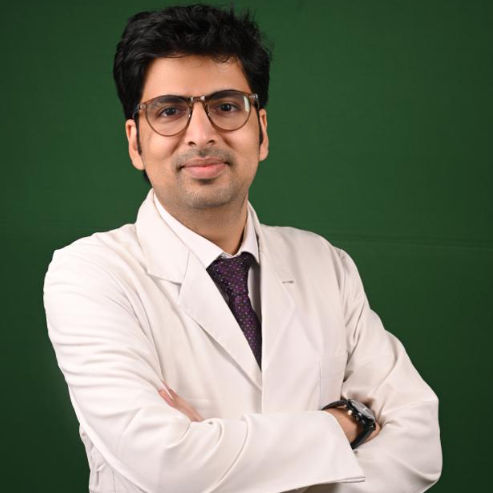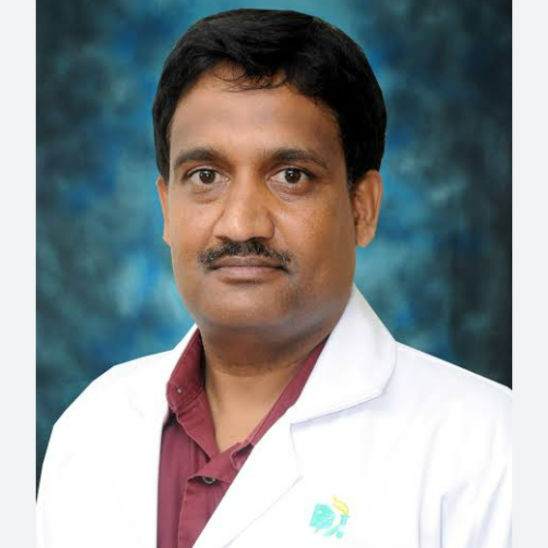How To Reduce Forehead Acne?
Reducing forehead acne is challenging but not impossible. Know the reasons behind it and learn how to treat it.

Written by
Last updated on 3rd Jul, 2025
Forehead acne is a common skin condition caused by excess oil, clogged pores, and daily habits. The skin produces too much oil or sebum when the acne occurs. As a result, the hair follicles under the skin and the pores get clogged. A cell called keratinocytes lies in the hair follicles. When someone gets acne, the sebum, hair and keratinocytes stay within the pores. These promote bacteria within the skin that cause redness, bumps, and pain. However, proper treatment and management can reduce this problem effectively.
Factors Contributing to Forehead Acne
Specific environmental and lifestyle factors can contribute to forehead acne. They even make the acne break out worse. Hormones are the most vital factors for developing acne on the forehead. The androgen hormones, specifically testosterone, cause acne.
The hormone becomes active during the teenage and young adult years. Women might get acne during menstruation due to hormone sensitivity. There are also other contributing factors to acne. These factors include -
- Certain weather conditions, such as humidity and air pollution
- Using greasy or oily personal care products such as heavy creams and lotions
- Working in an area where people come into contact with grease or oils regularly, such as cooking oil in restaurants
- Increased cortisol hormone due to stress
- Side effects of medication
- Certain foods like high-sugar foods, whey protein, and skim milk can also contribute to acne development
Preventative Measures
There is no specific strategy to get rid of forehead acne permanently. However, following specific skin care tips will help manage the acne. These are -
- Fragrance-free and sulphate-free cleansers should be used to wash the face twice daily. These will help remove excess dirt, oil, and sweat from the skin.
- Drying foaming cleansers and harsh physical scrubs should be avoided.
- Individuals must know their skin type while selecting skin care products accordingly. There are four types of skin - dry, combination, oily, and sensitive. For instance, people with dry and sensitive skin should use a creamy cleanser. For oily skin, people should use a gentle and foaming cleanser.
- The use of limited makeup is a safe practice for acne-prone skin. Also, it's mandatory to clean up all the makeup before sleeping at night.
- Touching the face should be avoided, as it can transfer bacteria that clog pores.
- A balanced diet with vitamin C and beta-carotene can help prevent acne. They have anti-inflammatory effects that reduce this issue. So, eating food such as vegetables, fruits, and leafy greens will be the best.
- Acne-triggering foods such as refined sugars, processed foods, and alcohol should be avoided.
- Stress management activities such as yoga, meditation, exercise, massages, aromatherapy, and journaling into regular life activities will be helpful.
Treatment Options
The treatments depend upon the severity of forehead acne. Over-the-counter creams or gels containing benzoyl peroxide will be helpful for mild acne.
The dermatologist prescribes some medications if a person gets persistent acne and even takes some steps to cure it. These medications include -
- Topical retinoids: These are vitamin A derivatives that help reduce clogged pores.
- Oral isotretinoin (Accutane): It's a retinoid that helps to prevent inflammation, skin bacteria, and clogged pores and reduce sebum production.
- Antiandrogen agents or oral contraceptives: These reduce the hormones that cause sebum production.
- Antibiotics: These reduce bacteria and inflammation of the skin. They are available in both oral and topical forms. For instance, doctors recommend oral antibiotics such as doxycycline (Doryx, Vibramycin) for severe acne and topical antibiotics such as clindamycin (Cleocin).
Also, individuals can try natural and home remedies for treating forehead acne -
- Tea tree essential oil: It incorporates a compound named terpinen-4-ol that kills bacteria, fungi, and viruses on the skin. Also, it promotes white blood cells that help in healing. So, applying 1-2 drops of tea tree oil in the inflamed area will be helpful.
- French green clay: It's an absorbent that has antibacterial properties. It can absorb excess oil from the skin, remove impurities, and reduce inflammation. The clay is available in the form of powder. People can mix the powder in water and apply it as a face mask. They can also add soothing elements such as honey or yoghurt to this mask.
- Aloe vera: The anti-inflammatory and antibacterial properties of aloe vera can prevent acne breakouts. Applying aloe vera gel with a soft mask and ultrasound applications will also be helpful.
- Zinc: The anti-inflammatory properties of zinc can reduce acne redness and lesions. People can get it through zinc supplements, zinc-containing ointments, and creams.
- Apple cider vinegar (ACV): The organic acids of ACV can kill the acne-causing bacteria P. acnes. A mixture of ACV and water with a 1:3 ratio should be applied to the face with a cotton ball after cleansing the skin, and leave it for 5-20 seconds.
- Fish oil supplement: Fish oils include two omega-3 fatty acids, docosahexaenoic acid (DHA) and eicosapentaenoic acid (EPA). These help to reduce the risk of acne.
Consult Top Experts for Personalised Treatment
Skincare Tips for Acne-Prone Skin
Caring for acne-prone skin needs some lifestyle changes. So, here are the tips from experts that will help individuals with acne-prone skin -
- Non-comedogenic products that won't clog pores, are oil-free, and are non-acnegenic should be used.
- It's important to wash the essentials that come into contact with, such as makeup brushes, bedding, and phone screens.
- Drinking plenty of water to stay hydrated.
- A broad-spectrum sunscreen (at least SPF 30) should be used to protect the skin from ultraviolet rays.
- Applying a toner to protect the skin from the excess oil.
- Shampoo and conditioners that contain oils should be avoided. These can cause acne breakouts on the forehead.
When to Seek Professional Help?
The following signs of forehead acne require medical attention -
- Painful and deep blemishes that cause irritation
- Acne that spreads to a significant body part
- Acne scarring
- Fluid-filled cystic acne
- Skin inflammation and discolouration
- Acne doesn't improve with OTC treatment
Options for dermatological treatments include -
- Hormonal therapy: Two hormonal therapies can clear acne in women. These are birth control pills and spironolactone.
- Chemical peels: These can cure certain types of acne.
- Laser or light therapy: Laser therapies can improve acne symptoms but can't cure acne. Thus, other treatments require laser therapy to cure acne.
Conclusion
Forehead acne makes individuals feel discomfort and gives a sign of unhealthy skin. Thus, this issue should not be neglected and needs proper care. There are several home remedies and OTC medications available for this issue. In case of further complications, individuals must consult a dermatologist for proper treatment procedures. Also, people should follow the basic skin care practices for acne-prone skin.
Consult Top Dermatologists
Consult Top Dermatologists
Dr. Kavitha Killaparthy
Dermatologist
23 Years • MBBS,DIPLOMA(DERMATOLOGY,VENEREOLOGY,LEPROSY)
Hyderabad
JDS Skin & Hair Clinic, Hyderabad
Dr. Paulomi Vartak
Dermatologist
2 Years • MBBS, MD (DERMATOLOGY,VENEREOLOGY AND LEPROSY)
Pune
Pramodini Urology Foundation and stree clinic, Pune
Dr. Mayuri Jain
Dermatologist
11 Years • MBBS, MD Dermatology , Venereology & Leprosy
Delhi
Dr Mayuri Jain Clinic, Delhi

Dr Ekansh Shekhar
Dermatologist
10 Years • MBBS MD
Lucknow
Apollo Clinic Hazratganj, Lucknow

Dr. H R Yogeesh
Dermatologist
20 Years • MBBS, MD (Dermatology, Venereology & Leprosy)
Bengaluru
Akshata skin and hair care, Bengaluru
Consult Top Experts for Personalised Treatment
Dr. Kavitha Killaparthy
Dermatologist
23 Years • MBBS,DIPLOMA(DERMATOLOGY,VENEREOLOGY,LEPROSY)
Hyderabad
JDS Skin & Hair Clinic, Hyderabad
Dr. Paulomi Vartak
Dermatologist
2 Years • MBBS, MD (DERMATOLOGY,VENEREOLOGY AND LEPROSY)
Pune
Pramodini Urology Foundation and stree clinic, Pune
Dr. Mayuri Jain
Dermatologist
11 Years • MBBS, MD Dermatology , Venereology & Leprosy
Delhi
Dr Mayuri Jain Clinic, Delhi

Dr Ekansh Shekhar
Dermatologist
10 Years • MBBS MD
Lucknow
Apollo Clinic Hazratganj, Lucknow

Dr. H R Yogeesh
Dermatologist
20 Years • MBBS, MD (Dermatology, Venereology & Leprosy)
Bengaluru
Akshata skin and hair care, Bengaluru
